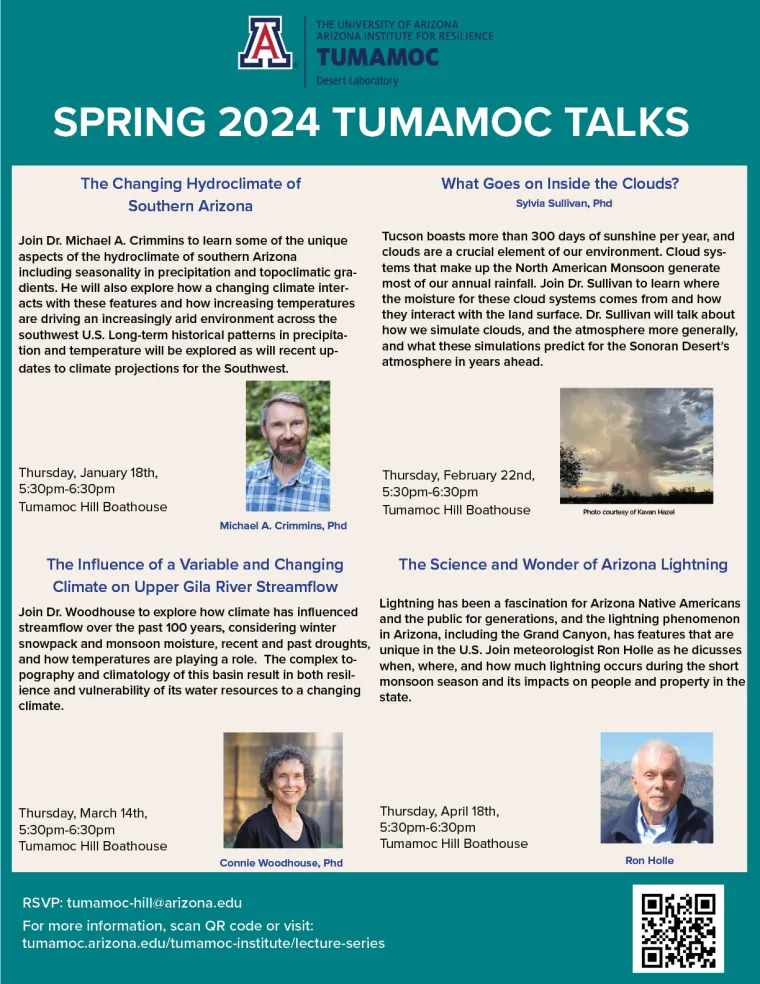
About our Presenters:
Dr. Michael A. Crimmins is on the faculty of the Department of Environmental Science at the University of Arizona and is a Climate Science Extension Specialist for Arizona Cooperative Extension. In this position he provides climate science support to resource managers across Arizona by assessing information needs, synthesizing and transferring relevant research results, and conducting applied research projects. His extension and research work supports resource management across multiple sectors including rangelands, forests/wildfire, and water resources as well as informing policy and decision makers. This work aims to support managers by increasing climate science literacy as well as developing strategies to adapt to a changing climate. He also serves as a drought monitoring expert on the Arizona Governor’s Drought Task Force and has worked with counties across Arizona to implement drought preparedness and impact monitoring plans.
- Dr. Sylvia Sullivan is an Assistant Professor of Chemical and Environmental Engineering at the University of Arizona. Sylvia received her B.S. in chemical engineering from the California Institute of Technology in 2012 and her Ph.D. in chemical engineering from the Georgia Institute of Technology in 2017. She was a postdoc at Columbia University for two years and a Young Investigator Fellow at the Karlsruhe Institute of Technology for another two. She started as an assistant professor at the University of Arizona in 2022.Sylvia is interested in multiscale interactions in the atmosphere, from ice crystal nucleation and fragmentation (crystallization and attrition) at the smallest scales to mesoscale storm propagation and evolution at larger scales. The group designs benchtop experiments to understand cloud processes and runs storm-resolving models on the UA high-performance computing cluster to quantify impacts on surface rainfall rates and the atmospheric energy balance.
- Dr. Connie Woodhouse is a Regents Professor in the School of Geography, Development and Environment at the University of Arizona. Her research focuses on understanding the hydroclimate of the past to inform current environmental and societal concerns, with a focus on major watersheds in western North America. While paleoclimatology is at the heart of her work, it inevitably extends to include the investigation and understanding of the current controls on hydroclimate. A strong component is the connection between the scientific aspects and the challenges of managing natural resources (especially water) in the face of changing demands, climate extremes, and climate change impacts. A transdisciplinary approach to research has become a primary theme, including not only an interdisciplinary approach, but integrating the perspectives of potential users of scientific information – not as an afterthought, but as a part of the process of shaping a science agenda. Dr. Woohouse's research considers how scientists should take responsibility for their role in addressing societal problems, and their role in educating the next generation of scientists in ways to promote the integration of science into decision making across a broad spectrum of users and decisions. Some of her current research projects include hydroclimatic reconstructions of the upper Colorado River basin, southern California, and the Missouri River basin. Other evolving interests include investigating past and current tree lines in the Colorado Rocky Mountains.
- Ron Holle is a meteorological consultant in Oro Valley, Arizona. Ron has worked extensively in meteorological education issues, particularly those relating to lightning safety and the demographics of lightning victims and damages around the U.S. and other countries. He has authored or co-authored 80 formally reviewed papers, 20 books and book chapters, and 360 informal papers. He is a member of the U.S. National Lightning Safety Council and serves on the Executive Committee of the African Centres for Lightning & Electromagnetics Network (ACLENet). He was elected a Fellow of the American Meteorological Society in 2009.

